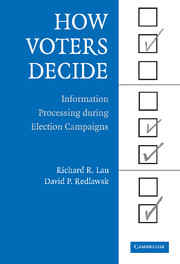Book contents
- Frontmatter
- Contents
- List of Tables and Figures
- Acknowledgments
- HOW VOTERS DECIDE
- I Theory and Methods
- 1 Introduction
- 2 A New Theory of Voter Decision Making
- 3 Studying Voting as a Process
- 4 What Is Correct Voting?
- II Information Processing
- III Politics
- IV Conclusion
- Appendix A Detailed Examples of Decision Strategies in Action
- Appendix B How the Dynamic Information Board Works
- Appendix C Overview of Experimental Procedures
- Appendix D Detailed Decision Scripts
- Appendix E Calculating the On-line Evaluation Counter
- References
- Index
- Titles in the series
4 - What Is Correct Voting?
Published online by Cambridge University Press: 05 September 2012
- Frontmatter
- Contents
- List of Tables and Figures
- Acknowledgments
- HOW VOTERS DECIDE
- I Theory and Methods
- 1 Introduction
- 2 A New Theory of Voter Decision Making
- 3 Studying Voting as a Process
- 4 What Is Correct Voting?
- II Information Processing
- III Politics
- IV Conclusion
- Appendix A Detailed Examples of Decision Strategies in Action
- Appendix B How the Dynamic Information Board Works
- Appendix C Overview of Experimental Procedures
- Appendix D Detailed Decision Scripts
- Appendix E Calculating the On-line Evaluation Counter
- References
- Index
- Titles in the series
Summary
The classic texts of democratic theory assume that for a democracy to function properly, citizens should be interested in, pay attention to, discuss, and actively participate in politics. The attention and discussion provide information about political affairs, which allows citizens to make political decisions (e.g., a vote) based on carefully considered principles reflecting their own self-interest and the common good. All citizens may not be able to live up to these standards – some may be too disinterested, or lack sufficient information, or lack the skills to understand politics, and as a consequence vote by habit or narrow prejudices, or not vote at all – but as long as a clear majority of citizens do live up to these standards, the collective wisdom of the people will prevail.
As discussed in earlier chapters, however, five decades of behavioral research in political science have left no doubt that only a tiny minority of the citizens in any democracy actually live up to these ideals. Interest in politics is generally weak, discussion is rare, political knowledge on the average is pitifully low, and few people actively participate in politics beyond voting (e.g., Berelson, Lazarsfeld, and McPhee, 1954; Campbell et al., 1960; Converse, 1964; Delli Carpini and Keeter, 1996).
The wide divergence between classic normative theory and political reality has led to two widely divergent responses.
- Type
- Chapter
- Information
- How Voters DecideInformation Processing in Election Campaigns, pp. 72 - 90Publisher: Cambridge University PressPrint publication year: 2006

